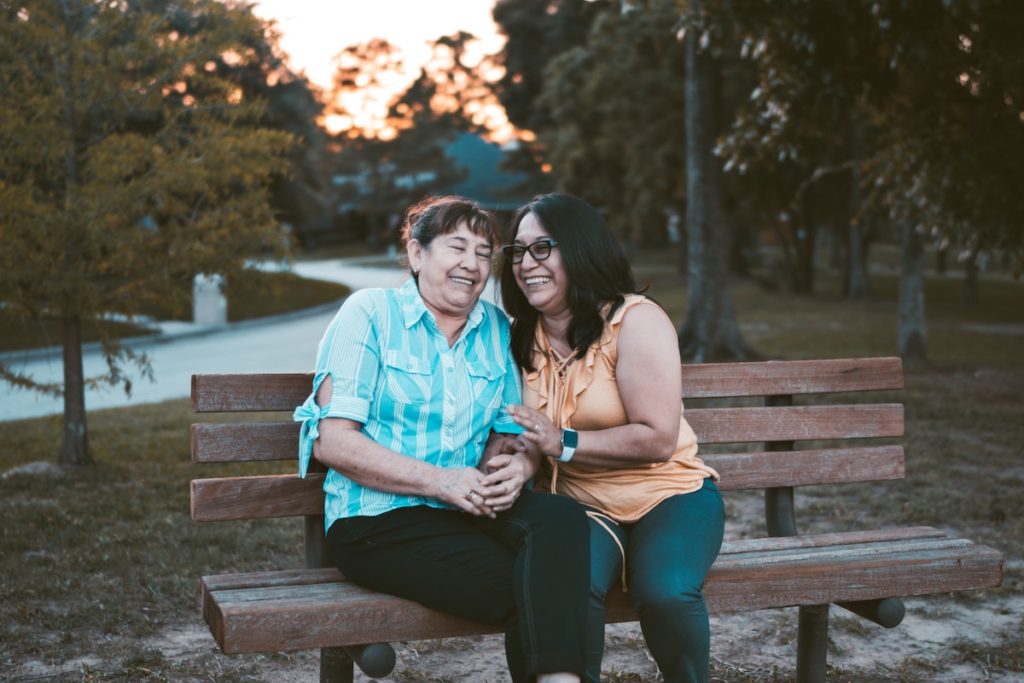
It is the year of 2020. A virus with the name SARS-CoV-2 causes a potentially fatal lung disease called COVID-19 in infected people and has spread globally into a pandemic. It has a tight grip over all of our lives, leading to a national lockdown in England with millions of us confined to our houses for months, losing our freedom to go out, meet family and friends and to use services we were so blissfully used to – a scenario at least I could only imagine possible in a movie until it really happened.
According to the European Centre for Disease Prevention and Control (ECDPC, 2020) to date (20 September 2020) 957,790 people have died worldwide from COVID-19. Recent statistics from England show that dementia is the “most common pre-existing condition for people dying of COVID-19” (Alzheimer’s Society, 2020). We all have experienced loss during this pandemic. However, there are some losses that are greater, more painful and less easy to get used to than others. My job in this blog is to reflect on a study which looked at the loss of access to social support services by people living with dementia and their unpaid carers in England as result of the pandemic.
Dementia comes in many forms, but it always involves a gradual decline of cognitive ability in the individual living with it and an increasing need for care and support (Alzheimer’s Society, 2019). In the United Kingdom (UK) there are an estimated 850,000 people living with dementia. At home, people living with dementia receive care and support either from paid carers or informal/unpaid carers, such as family members and friends. There are around 700,000 informal carers for people living with dementia in the UK (Dementia Statistics Hub, 2016). Here, we focus on people living with dementia who live at home and their informal carers.
There exist numerous social support services in the community for people living with dementia and their carers. These include day centres, which provide social care and activities during the daytime on a regular basis. Research has shown that day centres significantly improve the quality of life of attenders on various levels, including their mental and overall health and social participation (Orellana et al. 2020). Other support services may be meal deliveries, paid home care, peer support networks among others again with proven positive effects on the people using these services (e.g. O’Leary et al., 2020). Furthermore, social support services can provide much needed respite for unpaid carers and improve their quality of life too (Struthers, 2015).
Policy responses to the COVID-19 pandemic in the UK saw the doors of social support services in the community shut since the lockdown. At the centre of this blog is Clarissa Giebel and colleagues’ work on the impact of COVID-19 related closures of social support services on people living with dementia and their unpaid carers. It is the first academic research of its kind in England, providing qualitative evidence for what those of us who are keen to understand and improve the lives of people living with dementia and their carers may have already suspected: The amount of contact hours with social support services in the community decreased drastically during the national lockdown with severely negative consequences on the lives of people accessing them.

The amount of contact hours with social support services in the community decreased drastically during the national lockdown with severely negative consequences on the lives of people accessing them.
Methods
The methods of data collection for this study involved in-depth interviews with 50 people via telephone in April 2020, using a semi-structured process. Of these, 42 were unpaid carers aged 18 years or over and 8 were people living with dementia. Recruitment took place using a convenience sampling technique and engaging social support services and dementia support organisations. Giebel and colleagues (2020) also collected participants’ demographic information and the number of hours that participants were using social support services before the COVID-19 outbreak in England and one month into the lockdown.
Results
The study confirmed a “drastic” decrease in the hours of contact with social support services during the pandemic. People who had accessed such services on average of 12 hours per week before COVID-19 received an average of 4.5 hours of support per week since the onset of the pandemic. The impact on the lives of people accessing these services is summarised by the authors under three themes:
A sense of loss of control
This related to the sudden closures of services that had been a fixed part of the life of the person living with dementia and/or the carer. Participants reported that this sense of losing control over daily routines, coupled with the inability to access social services, caused significant stress. Furthermore, without the stimulation and social contacts usually provided by social support services, carers reported that they saw a, “faster deterioration of symptoms”, in the person they cared for.
A distressing sense of uncertainty
Not only regarding the future of, and access to, the social support services but also the meaning of public health restrictions. People living with dementia especially reported that they found it hard to comprehend why services had been shut and what the restrictions were that they had to follow.
A sense of having to adapt to the “new normal”
The study suggests that some people had higher levels of acceptance than others. Whereas some of the participants in this study reported they used social media channels to make up for the loss of face-to-face time usually enjoyed at their social support service, others said that online meetings could not replace time spent with people. Only a few people were offered online support by their services during the lockdown.

People living with dementia reported that they found it hard to comprehend why services had been shut and what the restrictions were that they had to follow.
Conclusions
- The authors suggest that the study’s findings highlight the need for greater support and recognition for already stretched and overburdened carers and;
- The need to increase social support services during the times of the pandemic to accommodate the needs of people accessing them;
- The study’s findings also indicate there should include a mixed approach of remote support together with social distancing compliant opportunities for face-to-face time.
Strengths and limitations
Academic research during the pandemic has been marked by urgency and speed. Giebel and colleagues (2020) successfully provide evidence for the reduction in contact hours with services since the emergence of COVID-19 caused by the national lockdown. Furthermore, through employing a qualitative methodology they captured the voices and experiences of people whose access to social support services was drastically reduced. The result is a paper which can ultimately help us shape better policies for the improvement of the lives of people living with dementia and their carers during the pandemic and beyond.
However, the authors point out an important limitation in their research caused by the “time-sensitive” nature of the study, which influenced the way they decided to recruit participants. This limitation concerns a relative lack of diversity in their research sample. It includes 42 carers and 8 people living with dementia. Of the sample, 7% of carers and none of the people living with dementia who were interviewed were from a black or ethnic minority background. The research therefore mostly reports the experiences of people from a white ethnic background. Further research would be necessary to capture voices of people from diverse backgrounds to understand if and how their experiences differed and what policy responses could be adopted to improve their lives during the pandemic. The small sample size of people living with dementia in the study means that it mostly reports carers’ views on the impact of closures on the lives of the people they care for and their own lives.
The research is furthermore limited to people who had access to services before the pandemic hit. It does not tell us about the experiences of those who tried to access social support for the first time during the pandemic and the impact the closures may have had on them. Taking into account that dementia as a pre-condition increases the chances of a lethal outcome for infected individuals, social support services may be needed to help affected people and their carers to stay at home and shield from infection. The research also does not capture possible opinions of people who may not have wanted or tried to access their usual services, perhaps due to being concerned about a COVID infection.
The authors decided to adopt a broad definition of social support services to include a large variety of types of such services, including home care, peer support groups, day centres and even residential care rather than focusing on specific ones. This presents a strength, as well as a weakness in the research at the same time; by not limiting the research to specific services, such as day centres, we now have evidence of shared experiences between people who access different kinds of social support services in the community. This is helpful to understand the impact of the COVID-19 lockdown on people living with dementia and their carers who access these services generally and shape policy responses accordingly. Nevertheless, the research is more limited in its ability to shed light on the impact of closures of specific services and what could help to offset them. It would, thus, be useful to have this broader research followed by more specific investigations into certain types of social support services and what is needed to support people who lost access to them.
The qualitative interviews clearly produced a rich set of data, which were analysed thematically by the research team. Each of themes that emerged is described briefly in the article with sub-sections and relevant quotations from participants. Each sub-section raises some fundamental issues which would be interesting to explore in much more depth. For example, Giebel et al. (2020) investigate the stress felt by many carers regarding future access to services which was difficult to gain even before the pandemic. This poses the question of how and why gaining access to services is perceived as difficult in the first place. As such, the findings as reported in the article raise many questions which surely would be worthwhile to pick up in future research for a more nuanced and even more in-depth picture on the impact of social support services in the community.

The study’s findings also indicate there should include a mixed approach of remote support together with social distancing compliant opportunities for face-to-face time.
Implications for practice
As a society which faced a social care system “in crisis” even pre-pandemic, we can draw some important wider lessons for the future from the voices in this research. The impact of service closures on the lives of those that use them, as shown in Giebel and colleagues’ research, highlights their importance in the social care system. Despite this, the study suggested that even in “normal” times carers and people living with dementia had difficulties gaining access to social support services. A Green Paper on the future of social care in England has long been overdue but it would be desirable to see new academic insights influence the future trajectory of social care more generally.

Even in ‘normal’ times, carers and people living with dementia had difficulties gaining access to social support services.
Statement of interests
The author knows the lead author of the publication on a professional basis.
Links
Primary paper
Giebel, C., Cannon, J., Hanna, K., Butchard, S., Eley, R., Gaughan, A., Komuravelli, A., Shenton, J., Callaghan, S., Tetlow, H., Limbert, S., Whittington, R., Rogers, C., Rajagopal, M., Ward, K., Shaw, L., Corcoran, R., Bennett, K., & Gabbay, M. (2020). Impact of COVID-19 related social support service closures on people with dementia and unpaid carers: a qualitative study. Aging & Mental Health, 1–8. https://doi.org/10.1080/13607863.2020.1822292
Other references
Alzheimer’s Society. (2019). Facts for the media. Alzheimer’s Society. https://www.alzheimers.org.uk/about-us/news-and-media/facts-media
Alzheimer’s Society. (2020). Office of National Statistics figures show dementia is main underlying condition for COVID-19 deaths. Alzheimer’s Society. https://www.alzheimers.org.uk/news/2020-05-15/ons-figures-show-dementia-main-underlying-condition-covid-19-deaths-alzheimers
Dementia Statistics Hub. (2016). Care services | Dementia Statistics Hub. Dementia Statistics Hub. https://www.dementiastatistics.org/statistics/care-service
ECDPC. (2020, February 5). Geographical distribution of 2019-nCov cases globally. European Centre for Disease Prevention and Control. https://www.ecdc.europa.eu/en/geographical-distribution-2019-ncov-cases
Orellana, K., Manthorpe, J., & Tinker, A. Day centres for older people: A systematically conducted scoping review of literature about their benefits, purposes and how they are perceived. Ageing and Society. 2020; 40(1):73-104.
O’Leary, M. F., Barreto, M., & Bowtell, J. L. (2019). Evaluating the Effect of a Home-Delivered Meals Service on the Physical and Psychological Wellbeing of a UK Population of Older Adults – A Pilot and Feasibility Study. Journal of Nutrition in Gerontology and Geriatrics, 39(1), 1–15. https://doi.org/10.1080/21551197.2019.1684417
Struthers, C. (2015, November 3). Dementia day programmes: assessing their effectiveness. National Elf Service. https://www.nationalelfservice.net/mental-health/dementia/dementia-day-programmes-how-can-we-tell-if-they-are-effective/
Photo credits
Photo by bennett tobias on Unsplash
